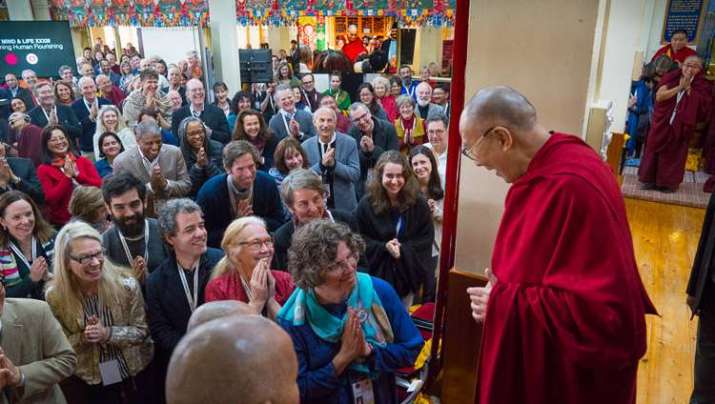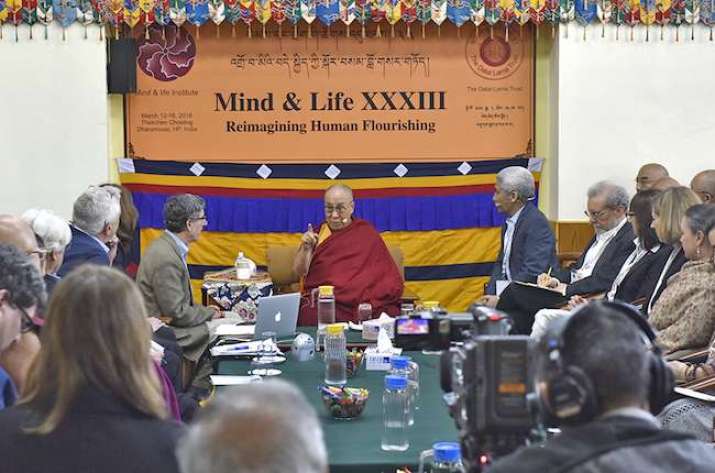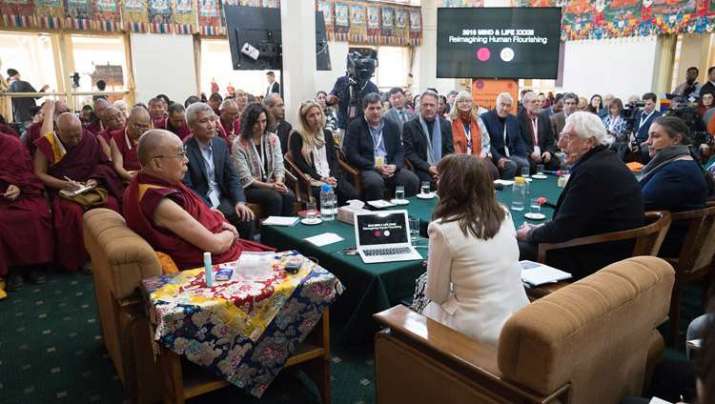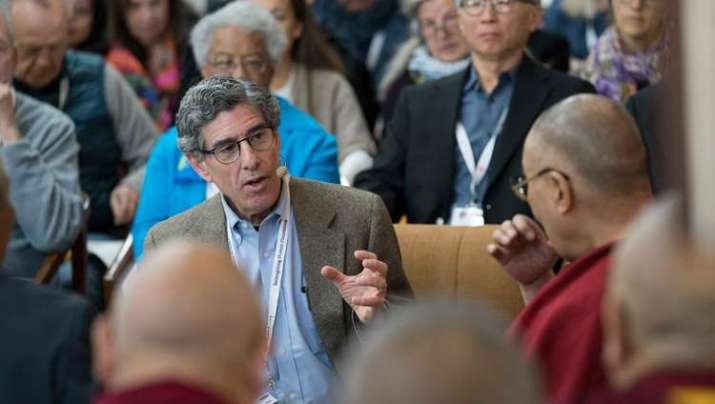
His Holiness the Dalai Lama on Monday welcomed more than 200 noted academics, scientists, education specialists, and Buddhist scholars to Tsuglagkhang, the temple complex adjacent to His Holiness’ official residence in Dharamsala for the 33rd Mind & Life Conference. This five-day meeting of minds and traditions of enquiry, running from 12–16 March, focuses on the theme “Reimagining Human Flourishing,” with an emphasis on education, childhood development, and education research.
Co-organized by the Mind & Life Institute and the Dalai Lama Trust, India, the gathering had two primary purposes, the Dalai Lama explained on Monday. First, sharing and expanding the application of modern and traditional knowledge, combining the findings of modern science with the understandings of ancient Indian contemplative traditions to better understand external and internal phenomenon. And second, bringing these fields of knowledge and learning to bear with compassion to reforming education, and by extension human society, to enable peace and relieve the widespread suffering and anguish caused by the numerous crises facing the world today.
“The time has come to think in terms of the whole of humanity not just our nation within its own boundaries,” the 82-year-old spiritual leader said in his opening address on Monday morning. “The environment, too, is telling us that we human beings have to work together as one community, which is the only way we’ll meet such serious issues as the increasing shortage of water. It will require a new approach to education that takes account of scientific findings and that cultivates human qualities on the basis of a secular scientific approach.” (His Holiness the 14th Dalai Lama of Tibet)

Based in Charlottesville, Virginia, the Mind & Life Institute was formed following a 1987 meeting between the Dalai Lama, lawyer and entrepreneur Adam Engle, and neuroscientist Francisco Varela, with the aim of bridging the divide between the empirical, materialist approach of modern science to investigating the nature of reality and improving the lives of humans and the planet, and the advantages and insights offered by contemplative practices and introspective methods refined ovr centuries. Its mission, the institute states, “is to alleviate suffering and promote flourishing by integrating science with contemplative practice and wisdom traditions.”
“This world with its human population may last another few thousand years, but we have to encourage the next generation to do things differently,” His Holiness explained. “I’m nearly 83, so I don’t have that much time left and when I’m gone I may go to heaven, if there is one. But I may be reborn on this planet since I pray to abide to dispel the misery of the world for as long as space endures and as long as living beings remain.” (His Holiness the 14th Dalai Lama of Tibet)
The Dalai Lama has for many years been a vocal advocate for open dialogue and sharing between modern research and traditional understandings of the human mind, emotions, psychology, and consciousness, and the intersections between these two methodologies that can be applied to improve society and the world. Topics to be addressed over the course of the five-day conference include “Social Emotional Learning and Education in the Classroom,” “Meta-Awareness and Attention Training in Education Research,” “Ethics and Compassion in Education Research,” and “Evaluation and Implementation: Challenges and Opportunities for Human Flourishing.”

The 32 previous Mind & Life conferences have brought together scientists and contemplatives to discuss a wide range of subjects critical to human society, including addiction, ecology, ethics, neuroplasticity, destructive emotions, altruism, and economics. Since its founding, the Mind & Life Institute has become a direct funder of individual research via its grant and scholarship programs, and organizer of the annual Summer Research Institute, and the biennial International Symposium for Contemplative Studies.
“At this very moment, when we are enjoying peace and comfort, another place on the same planet, same human beings in Syria, Yemen, and African states are being killed. That is today’s world,” His Holiness emphasized. “We cannot ignore this. We can’t be indifferent. We cannot solve these problems immediately but if we make an effort now, I think later part of the 21st century can be a little better. Now, more than ever, we need sense of concern for others’ well-being, compassion on the basis of the sense of oneness of 7 billion human beings. A universal framework of moral ethics that includes both believers and non-believers.” (His Holiness the 14th Dalai Lama of Tibet)

See more
His Holiness the 14th Dalai Lama of Tibet
Mind & Life Institute
Dharamsala Dialogue Livestream (Mind & Life Institute)
2018 Mind & Life XXXIII: Reimagining Human Flourishing (PDF)
His Holiness the Dalai Lama Chairs 33rd Mind & Life Dialogue in Dharamshala (Central Tibetan












